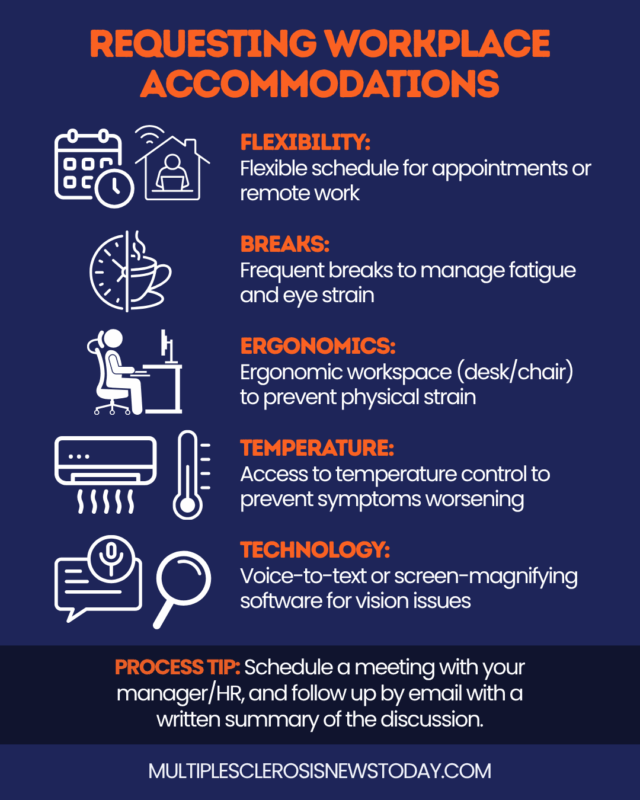 Discussion
Discussion
Workplace rights and employment after an MS diagnosis
Last updated April 23, 2025, by Agata Boxe
Being diagnosed with multiple sclerosis (MS) can bring uncertainty and anxiety about many aspects of your life, including your career.
You may be worried that MS symptoms — such as fatigue, vision problems, and cognitive issues — may affect your ability to work and support yourself or your family. You may also be concerned about disclosing your chronic illness at work and requesting accommodations.
Fortunately, there are ways to help you manage your employment and health, from learning about workplace rights and accommodations to considering new career opportunities.
Understanding your workplace rights with MS
Knowing your rights in the workplace can help you feel more confident about advocating for yourself.
In the U.S., employers with 15 or more employees are covered by the Americans with Disabilities Act (ADA), which protects people with physical or mental impairments.
Employee rights under the ADA require that those companies and institutions provide reasonable accommodations for chronic illness as long as they don’t cause undue hardship to the employer.
Employers with at least 50 employees must also comply with the Family and Medical Leave Act (FMLA). Under this federal labor law, you may be eligible for up to 12 weeks of unpaid annual leave to manage MS health issues. Contact your employer’s human resources department if you have questions regarding FMLA eligibility.
Most states also have their own state discrimination laws, and some have paid leave laws, with varying rules and compliance criteria. Make sure to check the specific laws of your state.
Other sources of information about rights and disability accommodations include:
Requesting workplace accommodations with MS
MS symptoms such as muscle weakness, fatigue, and pain can make it hard to get through the workday. Asking for reasonable accommodations can help you continue doing your job with less impact on your well-being.
First, consider your symptoms and what accommodations may support you in working with a chronic disease.
Examples of accommodations include:
- remote work to help deal with fatigue
- flexible schedule for attending medical appointments
- ergonomic workspace to prevent physical strain
- voice-to-text and screen-magnifying software to help with vision issues
- frequent breaks to address fatigue and eye strain
- access to temperature control to prevent MS symptoms from worsening in extreme temperatures.
Then, schedule a meeting with your manager, a human resources representative, or both, and ask them for accommodations. Follow up by email to summarize the discussion and include a list of accommodations if you agreed on any.
Employees who belong to a union can consult a union representative and bring them to the meeting.
If you are worried about how your employer may respond, consider consulting a disability rights attorney before speaking with your employer. They may be able to provide additional guidance.

Handling workplace discrimination
An attorney can also best address concerns or questions about potential workplace discrimination with a chronic illness. Legal professionals are knowledgeable about issues related to chronic illness and workplace rights, such as federal and state discrimination laws and ADA protections for MS.
For example, they can tell you how to proceed if your employer has denied your request for reasonable accommodations. They can also recommend what to do if you feel you are being treated differently or unfairly because of your health condition.
Although some federal and state agencies accept discrimination complaints from people without legal representation, you should still talk to an attorney first. They can help ensure that your rights are protected during and after the complaint process.
Balancing career and health with MS
Managing fatigue and other MS symptoms at work can help you navigate the potential impact of the disease on your career.
Try to conserve your energy throughout the day by taking regularly scheduled breaks to let your eyes and mind rest. Incorporating mindfulness meditation and deep breathing can also help you recharge.
Additionally, adjusting your work environment can help you manage some of the physical symptoms of MS. Consider asking an occupational therapist to assess and adapt your workspace as needed. For example, they may be able to recommend a specific desk and chair to reduce physical strain.
Finally, building a support network can provide comfort, empathy, and understanding. You can meet peers who can offer advice on working with MS in the Multiple Sclerosis News Today Facebook group.
Preparing for the future
You may be understandably concerned that MS may one day prevent you from doing your current job. Preparing for this possibility can help you feel more secure about your financial future.
Disability insurance
Check if your employer offers disability insurance; if they do, look up what it covers. Make sure to read the fine print. Many plans have exclusions for preexisting conditions, such as MS; others offer coverage, but after a more extensive waiting period (how long you will have to wait before you can receive insurance benefits).
Another type of disability insurance, with its own eligibility criteria, is Social Security Disability Insurance. One of the requirements is that you must earn a certain number of work credits measured through the amount of income you have made.
New career paths
At some point, you may need to explore positions that may be more responsive to your changing symptoms. For example, you may realize that working remotely would allow you to manage your MS better, but you can only perform your current job in person.
Finding a job that suits your needs may mean a career change, which can feel scary and overwhelming. To ease the transition, try these strategies:
- Make a list of careers where you could apply your qualifications and experience.
- Tailor your résumé to a new position by identifying transferable skills.
- Take an online course or pursue a certificate that can open doors to new opportunities.
- Consider hiring a career coach to help you land a position in a different industry.
- Reach out to your social network, in person and online, and ask for help.
Living with MS presents unique challenges in the workplace, but with the proper knowledge, support, and planning, you can continue to build a fulfilling career. By understanding your rights, seeking accommodations, and preparing for the future, you can take proactive steps to navigate employment while prioritizing your health and well-being.
Multiple Sclerosis News Today is strictly a news and information website about the disease. It does not provide medical advice, diagnosis, or treatment. This content is not intended to be a substitute for professional medical advice, diagnosis, or treatment. Always seek the advice of your physician or other qualified health provider with any questions you may have regarding a medical condition. Never disregard professional medical advice or delay in seeking it because of something you have read on this website.
Recommended Posts
- Ironically, cutting out coffee gave me a boost of energy
- MS Awareness Month events highlight advocacy, education, fundraising
- I’m going to be more open about my invisible scars from MS
- Having parents who smoked increases risk of pediatric MS: Study
- Ocrevus and Tysabri appear to work equally well to control relapsing MS
Related content
-
 Discussion
Discussion
-
-




